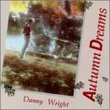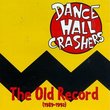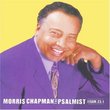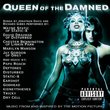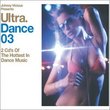| All Artists: Ludwig van Beethoven, Leonard Bernstein, Vienna Philharmonic Orchestra Title: Beethoven: String Quartets Op 131 & 135 / Bernstein Members Wishing: 3 Total Copies: 0 Label: Deutsche Grammophon Release Date: 11/10/1992 Genre: Classical Style: Chamber Music Number of Discs: 1 SwapaCD Credits: 1 UPC: 028943577922 |
Search - Ludwig van Beethoven, Leonard Bernstein, Vienna Philharmonic Orchestra :: Beethoven: String Quartets Op 131 & 135 / Bernstein
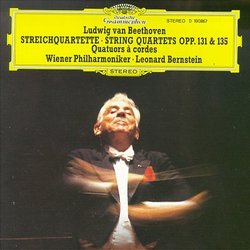 | Ludwig van Beethoven, Leonard Bernstein, Vienna Philharmonic Orchestra Beethoven: String Quartets Op 131 & 135 / Bernstein Genre: Classical
Deutsche Grammophon concludes its series of Leonard Bernstein's final recordings with orchestrations of two of Beethoven's late string quartets. — Genre: Classical Music — Media Format: Compact Disk — Rating: — Release Date: 1... more » |
Larger Image |
CD DetailsSynopsis
Product Description Deutsche Grammophon concludes its series of Leonard Bernstein's final recordings with orchestrations of two of Beethoven's late string quartets. Genre: Classical Music Media Format: Compact Disk Rating: Release Date: 10-NOV-1992 Similarly Requested CDs
|
CD ReviewsSound from the other side of the Universe dv_forever | Michigan, USA | 12/19/2005 (5 out of 5 stars) "This recording seems to invite a lot of scoffing from purists. I'm a purist too, so why am I not scoffing? What's wrong with trying something different for once, it's not like the full string orchestra treatment is ever going to replace the real deal string quartet ensemble for which it was originally written. Bernstein himself said that this was his favorite of all his recordings. Since he recorded such a great deal, it's a remarkable statement by a conductor of his caliber. He dedicated this record to the memory of his wife. What can be said about Opus 131 that hasn't already been said? It's the greatest string quartet ever written, even superior to Beethoven's other immense achievements in this genre. Playing this work on a full string orchestra perhaps takes away the intimacy of the chamber medium but it also gives it a vision and grandeur that we all know is inherent in the music. The slow, painful fugue that opens the work is music of the highest sublimity, for once it's great to hear it played by a full body of strings. Those strings belongs to the Vienna Philharmonic, so you know this is a performance for the ages. The 7 linked movements of Opus 131 are a monument to Beethoven, the architect. The long sequences of variations for instance or the short adagio prelude to the final movement, God, it doesn't get better than this. Yes, I do ultimately prefer the chamber version for 4 instruments, my favorite recording is by the Lindsay Quartet from the early 1980's, but Bernstein creates some enticing magic here that is worth the asking price. Sometimes I'll play this to people who would not normally engage with a string quartet but are easily won over by a string orchestra. Think Samuel Barber's Adagio for Strings but much longer, varied and profound. The Opus 135 might not work as perfectly in string orchestra form as Opus 131, but so what? It's utterly gorgeous played this way. Perhaps the inner voices are obscured but look at the compensation that you get in the Lento Assai slow movement! Mahler is known for his slow movements but he is out-classed easily by Beethoven in the slow movements in Opus 135 and 131 as well as countless other movements like the adagio of the Ninth Symphony, Eroica funeral march, Opus 111 final movement, the Hammerklavier adagio, Benedictus from the Missa Solemnis, the Holy Thanksgiving movement from Opus 132, I could go on forever baby! Beethoven, a supreme master. We should certainly be willing to listen to different approaches to his works and this Bernstein record is one such approach. If you listen on headphones you can hear the subtle moans of pleasure emitting from Bernstein on this CD. Don't worry, it's barely audible and is not at all a distraction, just a confirmation of how deeply the music moved him. For a string quartet version, go for the Lindsay Quartet recordings from the early 80's, very deeply felt, much more so than the Alban Berg or Emerson Quartet. However, if you're adventuresome, then buy this CD as well to have and cherish as a substitute to play once in a while. It won't replace the real thing and it doesn't have to. Musical perfection comes along very rarely and it's an honor to be able to explore it in different guises." Easy to digest if Op. 131 is not a sacred cow to you John Grabowski | USA | 01/15/2005 (4 out of 5 stars) "If you think Beethoven should not be altered in any way, then this recording isn't for you. But keep in mind that "The Master" adapted his own works oftentimes, and something tells me he would not have objected to Lenny's approach here (which is Dmitri Mitropoulos' approach, actually, since the whole idea was his initially). Heck, Beethoven didn't balk when the publisher asked him to substitute his monumental Grosse Fugue finale to Op. 130. Furthermore, no one objects when his Leonore No. 3 Overture is inserted into the beginning of the second act of Fidelio. Frankly, I think Ludwig would consider this CD with a mind more open than most reviewers. And there's lots to like here. The Vienna strings (I agree with Lenny that they are the "rightest" ones for the role) play with aching beauty and pin-point precision. If you just collect incredible examples of string playing, this is a CD you should have. As for the interpretation, it's amazing how often things sound "right" to my mind, though I find Bernstein's handling of the first movement a tad overblown towards the end. Where he misfires there, however, he scores big time in the central theme-and-variations movement, where every tempo choice is well-considered, and 60 strings make more coherence out of the second-to-last variation than I've heard most quartets do. The scherzo too is amazing for both its virtuosity and for getting the moment *absolutely right.* The finale is relentless and powerful; too often it sounds almost puny in the hands of some string quartets. It's like a late-period Eroica, and it sounds right with large forces. Bernstein said at the time this performance was broadcast on PBS (in the early 80s) that he considered this performance the greatest achievement of his life, and that he wanted listeners to think of it as "Beethoven's Tenth Symphony." Maybe or maybe not (though it's certainly more satisfying than the recent attempt to finish what would have actually been Beethoven's Tenth Symphony), but the quartet is certainly sublime in this incarnation. It's true many of the work's chamber qualities are lost, but many other qualities are gained, especially in the first, fourth and seventh movements, and nay-sayers should listen to the plusses as well as the minuses. I wouldn't want to hear the work performed all the time this way, and in fact I only play this disc occasionally, preferring the standard chamber account most of the time. But there's nothing sacreligious about this version. Op. 135 doesn't fare nearly so well, however (okay, it's a dud), and I'm puzzled as to why Bernstein chose this as the *other* late quartet to orchestrate. Of all the late Beethoven quartets, it is the most "earthbound," the least ethereal. Even the slow movement, wonderful as it is (and I rank it as one of Beethoven's very best in the balance of form and content, with Bach-like logic to its progression), is earthbound, gloriously so. Op. 131 has a certain incandescent quality that presages Mahler and Bruckner, and the massive string sound work with it. Op. 135 was Beeethoven returning to earth after the celestrial journey--a changed man, no doubt, and it's a pity he didn't live to write more string quartets, because I'd like to know what would have come next--but still, this is earthbound Beethoven, no matter how changed. The massed strings just get in the way of that, and they fight the music, to my ears. I cherish this disc, but never play Op. 135, only Op. 131. More puzzling, in that same interview for the PBS special, Bernstein said he felt that Op. 131 was the only quartet that lent itself to a massed string approach. He was right; I wonder why he changed his mind several years later for this Op. 135 recording. But this CD is worth the price just for the C-sharp minor quartet, which dominates the disc anyway. I recommend this for any Beethoven collection, provided you aren't pedantic. It's not a substitute for the "standard" Op. 131 string quartet performance, but it does augment it nicely, and even sheds a little new light on the work." The one in c sharp minor is awesome A. Souto | Bs As, Argentina | 05/01/2005 (4 out of 5 stars) "I have to admit that I was impressed by the wonderfull playing of this particular piece. I do believe that the f major quartet has it's moments, like the lento assai e cantante tranquilo, but the disc is about op 131. I guess that op 135 was performed to fill space on a 80 minute disc, but it has some extreme moments that are marvelous anyway. It's right that some string quartets won't fit on a string orchestra, but this particular (op 131) do, and it's structure works wonderfully in the hands of the Wiener Philarmoniker."
|

 Track Listings (11) - Disc #1
Track Listings (11) - Disc #1